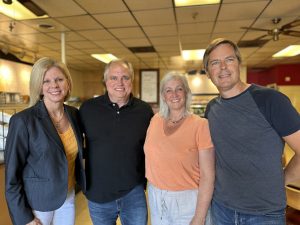The digital age has brought a lot of changes in music. Where I once had a carefully curated collection of a few thousand songs I was willing to pay for, I know have on tap millions that I will likely never take the time to listen to thanks to various streaming services. The amazing artistry of an album has become lost in the rapid rise of innovation.
To find artistry again, it would require another major innovative pendulum swing back toward an art first approach that still embraces technology and the access of streaming. That move back to art may very well be coming from the unlikeliest of places, right here in Little Rock.
Epiphany Morrow (stage name Big Piph) launched his take on what the future of album producing could look like earlier this month with an interactive album delivered through an app called the Legacy Project. It is as ambitious as it is thoughtful. To understand it and why launching it in Little Rock is as important to the overall success as anything, you have to first understand Piph.
Epiphany moved to Pine Bluff when he was seven and graduated from Pine Bluff high school in 1997. After that Epiphany left the state and went to college at Stanford, eventually graduating with a degree in mechanical engineering.
“I never felt like I wanted to do mechanical engineering, it just seemed like the coolest major,” Morrow says. “With mechanical I wanted to go design rides for theme parks. I really also found a love for screenplay writing at the time.”
He had one major problem, especially for a future hip hop artist, he was terrified of public speaking. He knew it was something he had to overcome so he forced himself into situations to help him deal with the situation, it was there that he found his love of performing hip hop music.
“My biggest fear was always public speaking. I always loved rap and hip hop, so I decided to try to get over my fear I would enter some talent shows. I straight up sucked,” Morrow laughs. “I realized by the end of the second one that I sort of like performing. I really loved being on stage and doing music, so I started working at it.”
Morrow had a hard time trying to decide to go into screenplay writing or pursue a hip hop career. He eventually decided to pursue hip hop, deciding that he could always come back to screenwriting later. It is likely that passion and equal desire to do both that heavily influenced his current project.
After college he decided to move to New York to pursue his rap career. Morrow had strong family ties to Brooklyn and Cleveland, cities he still visits frequently, so the move was natural. Unfortunately the early 2000’s rap scene in New York was exploding and the market was saturated. Groups with strong resources were starting to win out and dominate the market, making it hard for a startup to find a way.
“I went to New York and started a small record label there. We just didn’t have enough resources to compete on the level required in New York, we had three dudes and even our smallest competitors were rolling out with van loads of guys,”Morrow explains. “I realized we could come back here and do things well. At first I looked at it as a business move. Then I really started feeling compelled to do things with the community and it drove me to want to stay here.”
Morrow begin to find success in the local music scene and come into his own as an artist. That growth has allowed him to see growth for his music career across the world. He frequently goes on ambassador visits to other countries, he will be performing soon in Argentina for example. He also frequently goes back to places like New York where he is able to find more success without the competition of staying there.
Little Rock is home though, and at the end of the day it is where he wants to continue to grow his career. A quick look through his work and you can easily see his love of the area with scene after scene highlighting the city.
“I’ve been a lot of places, but Little Rock has influenced me so much that I really want to inject it into my work,” Morrow says proudly. “There are so many great things here and I like it so much. It is often not even a conscious effort to bring it into my work, it has become a natural extension of who I am.”
It is this wide background of seeing how things operate on a large level, combined with his love of performing and his desire to tell a bigger story that has brought Morrow to this very point. Little Rock is a city small enough to have space to come up with something new and creative without feeling the overwhelming pressure to compete, yet large enough and in close proximity to major cities to allow an idea to take hold and spread.
The Legacy Project is exactly that type of ambitious idea that would likely not work in New York where he got his start or Silicon Valley that educated him. But the influence of the two areas is clear throughout the thought process.
The project combines a typical album, with around 9 songs and music videos in a cohesive way. The videos have an overarching story line that weaves in and out of the overall song lyrics. New episodes are released every few days (until all are out), it is something that Morrow hopes encourages a longer interaction with the listener than listening to a random release from the album, or watching a video. It also means a considerable amount of additional production for Morrow and his team.
“It was the dumbest and most fun thing I have ever done. The video phase was by far the most fun, but it was dumb,” Morrow says. “I was getting anywhere between 3-5 hours of sleep. Every shoot presented its own problems. One of the upcoming videos has around 80 people in it, the level of coordination is unreal. I wouldn’t change it up any, it was some of the most fun I’ve had, but it was some long nights.”
Morrow’s collaborated with videographer Kenneth Bell and local hip hop artist Sean Fresh every step of the way. He brought in additional resources as needed, including having to hire out an entire outside production team for the 80 person shot.
Through the episodes you can see the careful planning and coordination that went into the work. The first three episodes are told from two different perspectives and really draw you into the story. The next two introduce new characters that will later tie back into the main story line. It is an approach that leaves me checking the app daily to see when the next episode will drop, it feels a lot like the level of dedication to watching Game of Thrones or Westworld. I can’t wait to see what comes next and where the story is going, Morrow’s screenwriting passion really shows in the story process. To make it all work the story and music had to evolve together.
“At first it was not going to be a larger story. As I was writing songs I started thinking we could do this and that,” Morrow says. “Then I started seeing a larger story and met with my video partner Kenneth to think about how all this could go. Once we laid out the story we went back and refined everything. Sometimes that meant changing a small portion of the song to match the video, or changing original plans for the video to match the song.”
Sprinkled throughout the episodes are small interactions points to bring the story to life. There are several areas of additional content that you can explore outside the story, much the way that successful television is operating currently. Morrow is also releasing supplemental behind the scenes shots to bring the audience into what goes on to produce the effort.
All of it is delivered through an app available both on Apple and Android, and both created from local app developer Luke Irvin.
“When it came to the app portion I was completely out of my element. It really helped to have someone that knew their way around,” Morrow says. “Really the whole process was a challenge. There was no blueprint to follow. I have made an albums before, so I know the process. I have made videos before so I know that process. With trying to develop the interactive album there was nothing to look to as guidance. I had to take a piece of this and a piece of that and try to make up the process, which honestly was exciting.”
The interactive album holds a lot of potential for the future. I have not spent this much time with an album since trying to find hidden things in the Green Day Dookie album cover. Sure, there are some faults in the approach, the overall UI of the app could flow better for example, but in concept it could really be the future of releases. Even better it ties in multiple ways to listen to just the album once you are done including popular streaming options, and gives the ability to buy merchandise and explore some of Morrow’s collaborators.
Morrow says he hopes to help other artists use the platform as well as continue to explore ways to use it on his own in the future. Both of which will be a very good thing for making the album, and the art of creating an album, relevant again.





